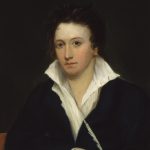In the preface to his collection of poems published posthumously in 1839, Mary Shelley (Mrs Shelley in the book) writes, “No poet was ever warmed by a more genuine and unforced inspiration. His extreme sensibility gave the intensity of passion to his intellectual pursuits; and rendered his mind keenly alive to every perception of outward objects, as well as to his internal sensations.” The poetry of Percy Bysshe Shelley who was born on 4 August 1792 is characterised by the ecstatic burst of inspiration that the Romatics were known and worshipped for. He was also lauded for his radical ideas and considered a rebel toward religious and political authorities which hindered publication of much of his works in his lifetime.
Shelley’s charismatic personality, his eventful life and accidental death due to drowning at the tender age of 29 also makes him one of the most scrutinised personalities of the Romantic period. To commemorate the birth anniversary of the great poet, our editors have chosen two poems from his expansive oeuvre.
Fragment: Wedded Souls
Published by Dr. Garnett, "Relics of Shelley", 1862.
I am as a spirit who has dwelt
Within his heart of hearts, and I have felt
His feelings, and have thought his thoughts, and known
The inmost converse of his soul, the tone
Unheard but in the silence of his blood,
When all the pulses in their multitude
Image the trembling calm of summer seas.
I have unlocked the golden melodies
Of his deep soul, as with a master-key,
And loosened them and bathed myself therein—
Even as an eagle in a thunder-mist
Clothing his wings with lightning.
Death
Published by Mrs. Shelley, "Posthumous Poems", 1824.
1.
Death is here and death is there,
Death is busy everywhere,
All around, within, beneath,
Above is death—and we are death.
2.
Death has set his mark and seal
On all we are and all we feel,
On all we know and all we fear,
3.
First our pleasures die—and then
Our hopes, and then our fears—and when
These are dead, the debt is due,
Dust claims dust—and we die too.
4.
All things that we love and cherish,
Like ourselves must fade and perish;
Such is our rude mortal lot—
Love itself would, did they not.
These poems are in the public domain and were reproduced from the Project Gutenberg archive.
Percy Bysshe Shelley (1792-1822) was an English Romantic poet.








